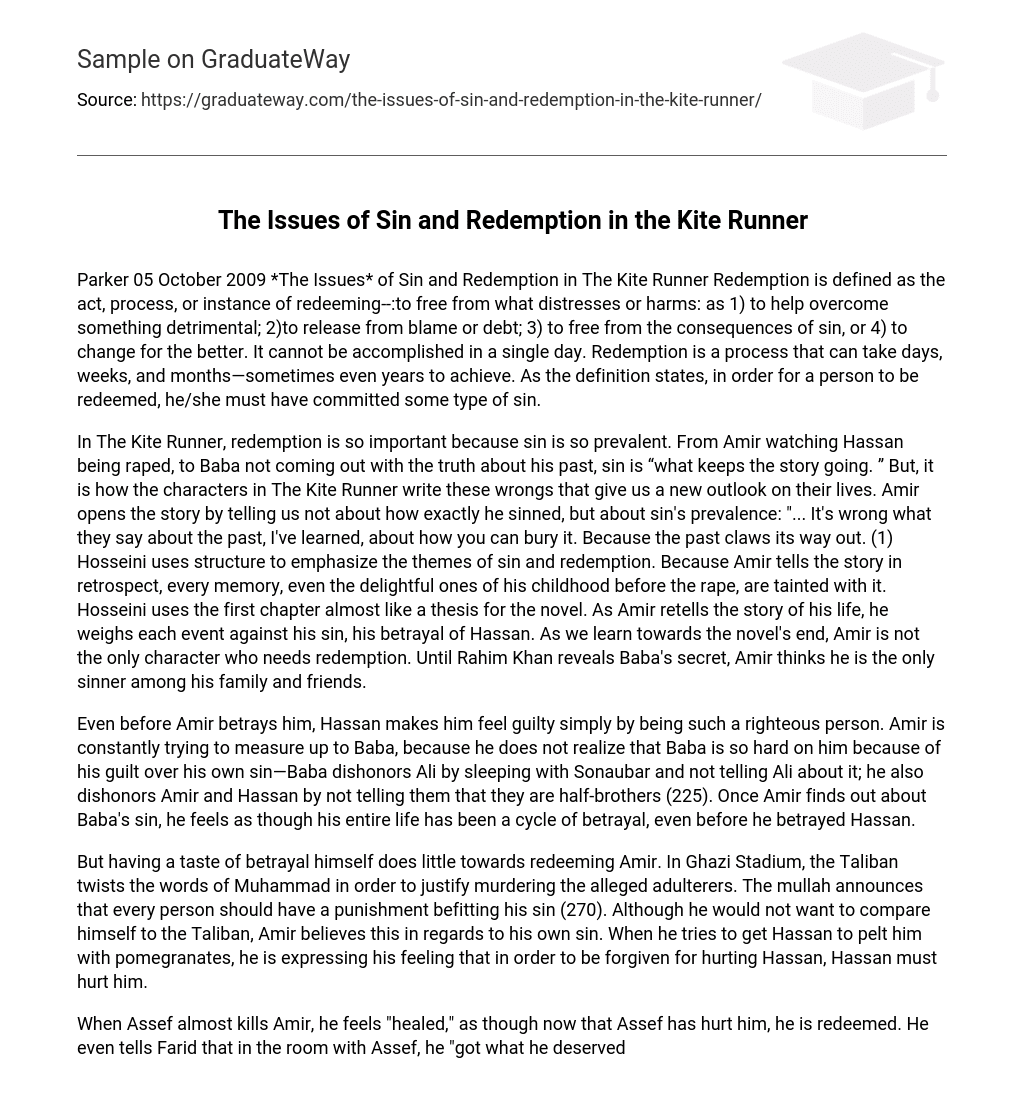Redemption is defined as the act, process, or instance of redeeming–:to free from what distresses or harms:
- to help overcome something detrimental;
- to release from blame or debt;
- to free from the consequences of sin,
- to change for the better.
It cannot be accomplished in a single day. Redemption is a process that can take days, weeks, and months—sometimes even years to achieve. As the definition states, in order for a person to be redeemed, he/she must have committed some type of sin.
In The Kite Runner, redemption is so important because sin is so prevalent. From Amir watching Hassan being raped, to Baba not coming out with the truth about his past, sin is “what keeps the story going. ” But, it is how the characters in The Kite Runner write these wrongs that give us a new outlook on their lives. Amir opens the story by telling us not about how exactly he sinned, but about sin’s prevalence: “… It’s wrong what they say about the past, I’ve learned, about how you can bury it. Because the past claws its way out.
Hosseini uses structure to emphasize the themes of sin and redemption. Because Amir tells the story in retrospect, every memory, even the delightful ones of his childhood before the rape, are tainted with it. Hosseini uses the first chapter almost like a thesis for the novel. As Amir retells the story of his life, he weighs each event against his sin, his betrayal of Hassan. As we learn towards the novel’s end, Amir is not the only character who needs redemption. Until Rahim Khan reveals Baba’s secret, Amir thinks he is the only sinner among his family and friends.
Even before Amir betrays him, Hassan makes him feel guilty simply by being such a righteous person. Amir is constantly trying to measure up to Baba, because he does not realize that Baba is so hard on him because of his guilt over his own sin—Baba dishonors Ali by sleeping with Sonaubar and not telling Ali about it; he also dishonors Amir and Hassan by not telling them that they are half-brothers (225). Once Amir finds out about Baba’s sin, he feels as though his entire life has been a cycle of betrayal, even before he betrayed Hassan.
But having a taste of betrayal himself does little towards redeeming Amir. In Ghazi Stadium, the Taliban twists the words of Muhammad in order to justify murdering the alleged adulterers. The mullah announces that every person should have a punishment befitting his sin (270). Although he would not want to compare himself to the Taliban, Amir believes this in regards to his own sin. When he tries to get Hassan to pelt him with pomegranates, he is expressing his feeling that in order to be forgiven for hurting Hassan, Hassan must hurt him.
When Assef almost kills Amir, he feels “healed,” as though now that Assef has hurt him, he is redeemed. He even tells Farid that in the room with Assef, he “got what he deserved. ” (298) In the end, Amir finds out that punishment is not what will redeem him from his sin. It is not even saving Sohrab. In order to atone for his sin and Baba’s before him, Amir must erase the lines of discrimination he has lived with all his life by giving Sohrab an equal chance at success and happiness in America.
Amir, though he needs forgiveness himself, has to forgive the important people in his life as part of his “road to redemption. ” Soraya needs Amir to forgive her before she can marry him. In the same way, Rahim Khan needs Amir to forgive him for keeping Baba’s secret before he dies. Rahim Khan is the one who truly understands how redemption occurs. He tells Amir in his letter, “I know that in the end, God will forgive. He will forgive your father, me, and you too.
Forgive me if you wish. But most important, forgive yourself. (302) Rahim Khan carries the novel’s ultimate message about forgiveness. God is merciful; it is people who are not. A person who is atoning for his/her sins is coming to terms with the sins by him/herself, without relying on a higher power. When Amir prays, he is still bound by fear and guilt; instead of wishing unselfishly for Sohrab to recover, he begs God not to leave “Sohrab’s blood on his hands. ” When Amir manages to forgive himself in the very last moments of the novel, he redeems himself at last. Redemption is all about making up for your past wrongs.
A person cannot run from his sins forever; eventually, they will catch up with you. There were plenty of scenes in the novel where Amir could have turned his back and kept “running away” from his past. But, Amir is tired of running. He is tired of carrying the guilt of what had happened to Hassan. Just as Baba redeems himself for what he did to Ali by doing marvelous deeds for others (building orphanages, lending money to his neighbors), Amir redeems himself by putting others before himself and giving Sohrab a second chance.
There is a part of a person that will always remember the bad things that he/she has done. But, two things should overshadow that part: the person acknowledges what he has done wrong and tries to never make the same mistake again, and the lessons, both good and bad that he/she learns from the mistake. Redemption is the combination of lessons learned, the good deeds that a person does as a result of the sins that they have committed, and self-forgiveness.





